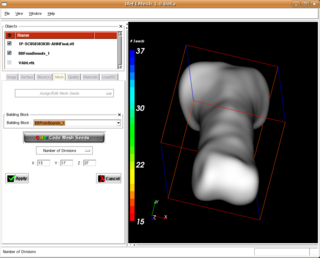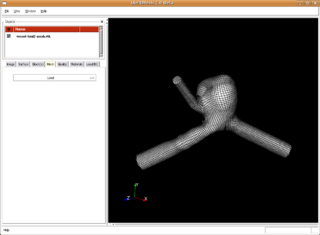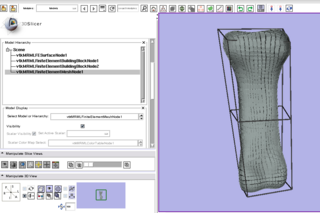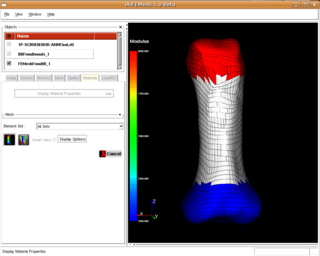NA-MIC/Projects/External Collaboration/Mesh Generation Summer 2008
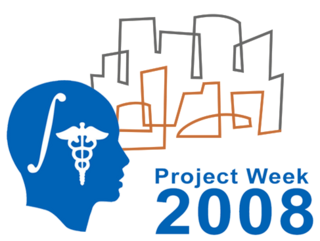 Return to Project Week Main Page |
Key Investigators
- Iowa: Nicole Grosland, Kiran Shivanna, Vincent Magnotta
- Isomics: Steve Piper
- Knowledge Vis: Curt Lisle
Objective
We are developing methods generation of finite element meshes. This includes both semi-automated techniques using building blocks that can be manipulated with a number of new VTK widgets, and fully automated mapped meshing techniques. Our group is focused around the application of these tools to study orthopaedic biomechanics, but there are several other potential applications.
Approach, Plan
Work during the project week will continue much of the work that we have undertaken over the past year. Several integration projects are planned:
- Update existing voxel meshing execution model code. Bring it up to date with the changes that have taken place over the past six months with the base meshing code. Support now exists within Slicer3 for handling of unstructured grids and this should be propagated into this module.
- Work with Steve and Curt on changes to the meshing workflow.
- Work with Curt on unifying stand-alone and Slicer3 meshing code base.
- Discuss some issues with KWWidgets developers: Multi-column list box scrolling issues, and Notebook widget and potential for constant size tabs and scrolling tabs
Progress
- Much progress was made adding support for VTK Unstructured Grid datatypes as a subclass of models in Slicer3. Slicer's Model Hierarchy module was modified to include control over unstructured grids. This work is currently in the meshing branch of Slicer, but will be merged into the trunk in the next few weeks, after completing and testing what we developed this week.
- The mesh generation interface has stabilized now that all the desired features for creating meshes have been implemented and partially tested. These new editing functions will be integrated with Slicer and tested during the next few months.
- Several user interface bugs were fixed in mesh generation. Initial support for node and element set definitions have been added.
- Created a initial mesh from an Aneurysm as provided by Luca. Testing also being done on data provided by Adam Wittek.
References
- Grosland NM, Brown TD. A voxel-based formulation for contact finite element analysis. Comput Methods Biomech Biomed Engin. 5(1):21-32, 2002.
- Grosland NM, Bafna R, Magnotta VA. Automated Hexahedral Meshing of Anatomical structures using Deformable Registration. Computer Methods in Biomechanics and Biomedical Engineering. Accepted.
- Grosland NM, Shivanna KH, Magnotta VM, Kallemeyn NA, DeVries NA, Tadepalli SC. IA-FEMesh: An open-source, interactive, multiblock approach to musculoskeletal finite element model development. Submitted.
- P. P. P'ebay and D. C. Thompson and J. Shepherd and P. Knupp and C. Lisle and V. A. Magnotta and N. M. Grosland, New Applications of the Verdict Library for Standardized Mesh Verification. Pre, Post, and End-to-End Processing, Proc. 16th International Meshing Roundtable,Seattle, WA, 2007
Description
The Musculoskeletal Imaging, Modeling, and EXperimentation (MIMX) Program is a collaborative effort directed at computational modeling of anatomic structures. A primary objective is to automate the development of patient-/subject- specific models using a combination of imaging and modeling techniques, with particular emphasis on finite element modeling.
Publications
Links
Project Week Results: Winter 2008, June 2007
